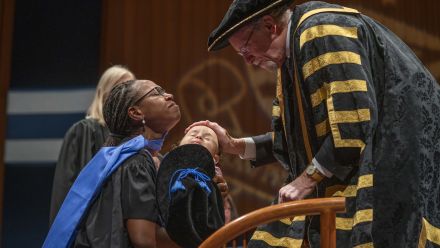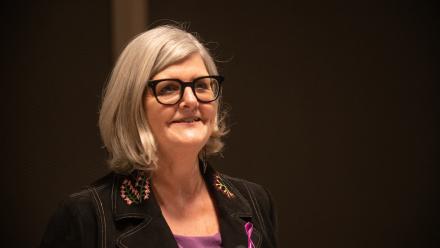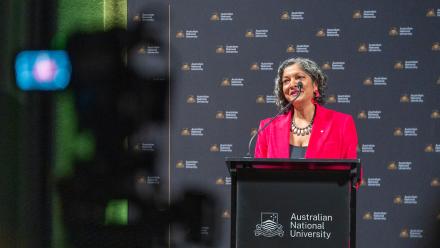Rosemary Clifford (BA, BPsych(Hons) ŌĆś18)
ŌĆ£Ask for help when you need, donŌĆÖt go it alone. We all need to look after ourselves and remember that our experiences matter. Each one of us bring to the table a story, an opinion and a diverse way of seeing things.ŌĆØ
An Academic and Mental Health Advocate, ANU Alumna Rose Clifford is studying a Doctor of Philosophy in Psychology, underpinned by a Bachelor of Arts/Bachelor of Science (Psychology) and Honours in Psychology from ANU. Rose aims to one day work in a space like the one that saved her life as a young adult, the Eating Disorders Program, and give back to the community that gave her a second chance.
From an early age, Rose knew she wanted to be a psychologist. She searched for universities that were equipped to provide her with a high-level of education in psychology with a strong research focus. One university stood out on these fronts: the ANU. Being in the same state Rose had made her home was an added bonus. She crossed her fingers, applied and was made an early offer into the Bachelors of Arts/Bachelors of Science (Psychology). From there, Rose went on to graduate with a Bachelor of Psychology Honours in 2017. Rose commenced the Doctor of Philosophy in Psychology in 2018.
Rose won the College of Health and Medicine Three Minute Thesis Competition in 2019 and as a result competed at the ANU Three Minute Thesis Final in the same year. She was invited to be a panellist at the College of Health and Medicine's International Women's Day event, which she says, "was a shock and a privilege."
Rose was awarded the Young Canberra Citizen of the Year in 2020 for her volunteer work in the mental health sphere and advocacy work as someone with a lived experience. She has featured on ABC radio Canberra various times, appeared in ABC Canberra TV segments and been the focal point of several ACT newspaper articles in relation to her mental health experience and work as a volunteer.
Rose volunteers for organisations such as Mental Illness Education ACT, Lifeline Canberra and Batyr ANU. "As someone with a lived experience in mental health and a researcher in the area I know the power lived experience story telling has on improving help-seeking and preventing adverse outcomes in mental health. Honestly, if sharing my story or sitting at the phones hearing other people's stories means that even one person has an easier time than I did and feels less alone, then everything I've been through is worth it."
Rose's favourite thing about the courses she studied at the ANU was being taught by such a diverse collective of academics, many of whom were women. Rose cites the opportunity to work with Dr Elizabeth Rieger as her PhD supervisor as the highlight of her journey to date. "Dr Rieger is not only the editor of the textbook we used during my favourite undergraduate course, but she is a researcher and a clinician in my field that I have always admired. She is the most amazing supervisor and has helped me to grow as a researcher and an individual."
Rose's dream is to be a clinician, specialising in eating and anxiety disorders among young people.
"I was very lucky to have recovered from my eating disorder as quickly and successfully as I did, in large part due to the amazing clinicians and treatment team working at the ACT Eating Disorders Program and my parents and now husband. They saved my life and gave me back a future and for that I will be eternally thankful. The invaluable work by clinicians and other mental health professionals literally saves lives and gives people a chance at a better life."
"We often speak of the importance of being able to see role models that resemble ourselves. Seeing so many strong and diverse women in leadership and prominent roles in their field, hearing the difficulties they faced, the challenges they overcame and hearing their stories of triumph and success have had an instrumental impact on my own confidence and belief that I can achieve as well."
"As someone who continues to struggle with confidence in my own ability, being surrounded by such strong women leaders and role models has been one of the reasons I entered into postgraduate study and intend on continuing to pursue my dream career as a psychologist and my confidence in speaking about my mental health journey."
"Psychology is a constantly changing field, so when you enter it, you do so under the assumption that you will need to be constantly adapting to changes and learning. I love learning, particularly in this area so it was a challenge I was willing to take on. I feel that we are seeing changes in the importance being placed on the mental health of those working in this field, our researchers, students, clinicians, academics etc. Their mental health and wellbeing are treated more seriously and we have more in place to assist should it be needed. I think we are also seeing more discussion around mental health and wellbeing in a normal way. Mental health and wellbeing is being normalised in the workplace and school environment as something that everyone could benefit from looking after."
Rose credits the ANU for developing her skills in a range of areas. These include working with a diverse range of people, communicating across age groups effectively, as well as how to connect with others on a deep level. "Having been knocked down and fallen over enough times I have learnt how to pick myself up and keep going and that I don't have to be the best, I just have to try my best. I think these things will help me to achieve my goals."
On reflection, Rose notes the importance of asking for further information, feedback or help when it is needed. "As a newly 18-year-old I feel many students, including myself, feel a pressure to achieve and succeed on our own without the help of others. I fell into this trap, like many of my fellow students, and because of this I did not ask for help or reach out as much as I needed when I was struggling. I asked questions sure, but I never saw my struggle as worth asking for actual help and support."
Rose encourages others to learn from her experience and ask for help when it is needed. "I did not seek out the support I needed. I have had anxiety for as long as I can remember and did nothing about it because I didn't know. Looking back and now being a teaching assistant I know this does not have to be the case, the ANU and its faculty know that every person has their own challenges and will always attempt to do the best they can to reduce the impact of these on their wellbeing and academic achievement."
Rose notes that the field of psychology can be challenging, and those in the field need to make sure they don't lose their voice and have people to support them when needed. "Ask for help when you need, don't go it alone. We all need to look after ourselves and remember that our experiences matter. Each one of us bring to the table a story, an opinion and a diverse way of seeing things. While no one's voice should be louder than the others, this isn't always how things work but try to remember that what makes you different from others makes you the kind of voice we need to hear."
Rose considers one hurdle in reaching gender equality for minority individuals is that they are still fighting in a large amount of areas to be viewed and accepted at all. "I can't imagine the struggles to achieve gender equality when a large portion of the world still don't accept the existence of genders outside male and female. Unfortunately, the world isn't where it needs to be for gender equality to be the standard on any level. Progress is being made and I truly hope that we will get to a world where all genders have equality and the diversity of those in our communities are celebrated rather than questioned.
On the topic of equality and diversity, Rose considers that there is still much to be done. "We need to see all voices as equal, value the ways in which we are different and understand that we will only survive as a community if we start working together equally. In terms of actual action, people often fight what they fear and fear what they don't understand or that which is unfamiliar to them. We don't see enough diversity shown in a positive light, we need to ensure that our communities are seeing diversity everywhere, how it is a benefit to us and how it will make us stronger as a community. The media, TV and Hollywood have for so long put diversity in a place of negativity, we need to bring it out of that place and put it where it belongs, in a positive light. Normalise gender diversity and show that it is not something to be feared but something to be excited about."
Rose notes the importance of asking for help. "For me it's as simple as that. I can't do a hundred things at once. I make sure I am engaging in self-care daily, reminding myself to take moments to enjoy the life I have. If we focus too hard on our goals or achievements we miss experiencing them. So my advice for getting through life is take a beat, a breath, ask for help, and remember that it's okay to not be okay, even superheros have off days so you can too."
Rose wants to spend her life doing a job and living a life she is proud of. She has always wanted to be a mother, suggesting her own caring and compassionate home life has led to the thought of a family with children bringing her joy. Rose says she is excited to see what the future holds. "Honestly, the last few years haven't gone according to the plan I had for myself and that led to some pretty amazing things nonetheless." She adds, "I absolutely want to continue all my volunteer work and continue to talk about mental health openly and honestly in the hopes of normalising it in our community and fight for the voices of those often silenced to be heard where it matters."


